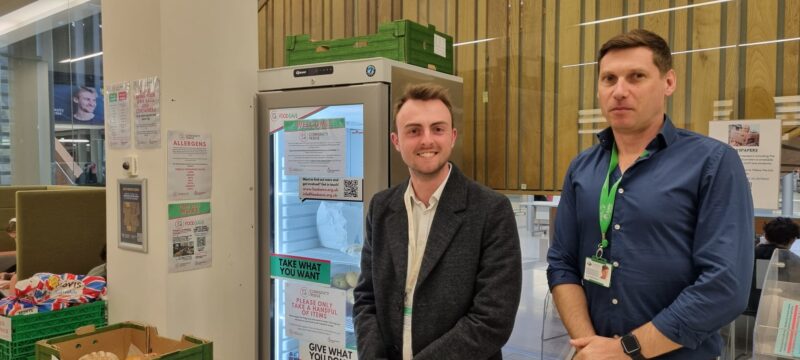On the 25th March, Devon-based non-profit Foodsave CIC opened its doors to another food waste reduction branch at Exeter University.
Foodsave opened its doors in 2020 for the area in and around Honiton. They focus on creating zero food waste communities, providing free food for anyone that wants it, using donations of perfectly useable food from businesses and individuals.
Jake Bonetta, founder and Director of Foodsave CIC, said: “It’s fantastic to be working with so many important stakeholders in and around the University of Exeter, getting this project off the ground. Foodsave relies on the support of volunteers in everything we do so if you are able to donate some of your time, we’d love to hear from you.”
Cllr Martin Pearce, Portfolio Holder for Communities and Homelessness Prevention and one of the Exeter City Councillors who provided Ward Grant funding to the project, said: “Although it’s sad that modern society needs the support of projects like this, it’s great to see Foodsave feeding people in a climate-friendly way, for free. The Council is very happy to support such a great initiative, supporting our wider food waste reduction work across Exeter.”

Exeter University’s Fridge has had funding from Devon County Council’s lottery funded ‘Food Rescue’ project and has opened its doors today. Students have been hit particularly hard by the cost-of-living crisis, so Foodsave’s openness to everyone means that even they will be able to freely use their resources.
Emma Croft, Food Rescue Project Manager at Recycle Devon, said: “Community Fridges make surplus food available to all for free so that good food gets eaten and not wasted. Food going to waste is a large contributor to climate change, so by using the Community Fridge we all get to play our part in helping the environment.”
Foodsave’s expansion into Exeter means that more people than ever will have more accessible ways of ensuring that they have something to eat in Devon. The non-profit saves over 1.5 tonnes of surplus food from being wasted a week, which equates to roughly 665 meals and reduces carbon emissions by over 5 tonnes. Surplus food includes everything that businesses can’t sell or individuals can’t use, such as food coming to the end of its legal shelf life, split multipacks, or food where packaging designs have been changed.
Sophie Wonnacott, Library Services Manager at the University of Exeter, said: “We are excited to be working with this initiative, working towards a sustainable reduction in food waste and supporting our community with the cost-of-living crisis.”
Alex Stanley, Education Officer at Exeter Students’ Guild and a key organiser for the project, said: “The Community Fridge is an exciting collaboration between several organisations which will be crucial for students in the midst of a cost-of-living crisis. Combatting issues around living costs is a key priority for the Guild, as determined by students, so we are pleased to be involved in a project that will do just that.”

